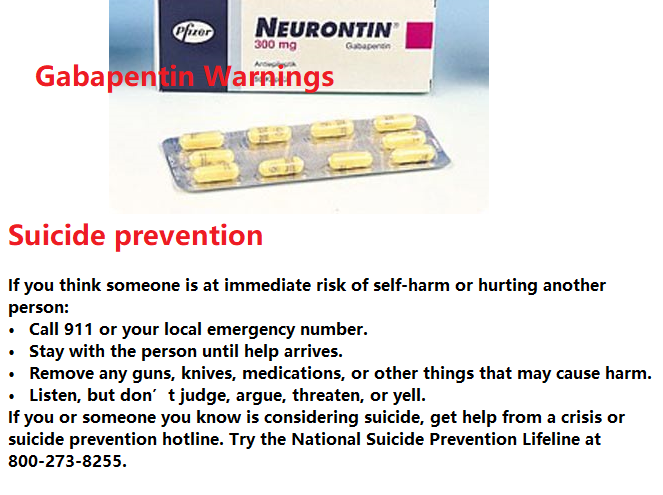It is very important that your doctor check your progress at regular visits, especially in the first few months if you have epilepsy. This will allow your doctor to see if the medicine is working properly and to decide if you should continue to take it.

These may be cause serious allergic reactions that may involve multiple organs, such as your liver or kidneys. Check with your doctor right away if you or your child have more than one of the following symptoms: fever, rash, swollen, painful, or tender lymph glands in the neck, armpit, or groin, unusual bleeding or bruising, or yellow eyes or skin.
Gabapentin may cause vision changes, clumsiness, unsteadiness, dizziness, drowsiness, sleepiness, or trouble with thinking. Make sure you know how you react to gabapentin before you drive, use machines, or do anything else that could be dangerous if you are not alert, well-coordinated, or able to think or see well. If these side effects are especially bothersome, check with your doctor.
gabapentin may cause some people to be agitated, irritable, or display other abnormal behaviors, such as feeling sad or hopeless, getting upset easily, or feeling nervous, restless, or hostile. It may also cause some people to have suicidal thoughts and tendencies or to become more depressed. If you, your child, or your caregiver notice any of these side effects, tell your doctor right away.
gabapentin will add to the effects of alcohol and other CNS depressants (medicines that make you drowsy or less alert). Some examples of CNS depressants are antihistamines or medicine for hay fever, allergies, or colds, sedatives, tranquilizers, or sleeping medicines, prescription pain medicine or narcotics, other medicines for seizures (eg, barbiturates), muscle relaxants, or anesthetics, including some dental anesthetics. Check with your medical doctor or dentist before taking any of the above while you or your child are using gabapentin.
Do not stop using gabapentin without checking with your doctor. Stopping the medicine suddenly may cause seizures. Your doctor may want you or your child to gradually reduce the amount you are taking before stopping it completely.
Make sure any doctor or dentist who treats you knows that you are using gabapentin. gabapentin may affect the results of certain medical tests.
Do not take other medicines unless they have been discussed with your doctor. This includes prescription or nonprescription (over-the-counter [OTC]) medicines and herbal or vitamin supplements.
Gabapentin warnings
Gabapentin oral capsule comes with several warnings. Call your doctor if you start having more seizures or a different kind of seizure while taking this drug.
Drowsiness warning
Gabapentin can slow your thinking and motor skills and cause drowsiness and dizziness. It’s not known how long these effects last. You should not drive or use heavy machinery while taking this drug until you know how it affects you.
Depression warning
Using this drug increases your risk of suicidal thoughts and behavior. Talk to your doctor if you feel depressed or notice any changes in your mood or behavior. Also talk to your doctor if you are having thoughts of harming yourself, including suicide.
Multiorgan hypersensitivity/DRESS warning
This medication can cause multiorgan hypersensitivity. This is also known as a drug reaction with eosinophilia and systemic symptoms (DRESS). This syndrome can be life-threatening. Call your doctor right away if you have symptoms such as a rash, a fever, or swollen lymph nodes.
Allergy warning
Gabapentin can cause a severe allergic reaction. Symptoms can include:
- trouble breathing
- swelling of your throat or tongue
- hives
- rash
Don’t take this drug again if you have ever had an allergic reaction to it before. Taking it a second time after any allergic reaction to it could be fatal (cause death).
Alcohol interaction warning
Avoid drinking alcohol while taking gabapentin. Gabapentin can cause sleepiness, and drinking alcohol can make you even more sleepy. Alcohol can also make you more likely to feel dizzy and have trouble concentrating.
Warnings for people with certain health conditions
For people with epilepsy: Don’t stop taking gabapentin suddenly. Doing this can increase your risk of having a condition called status epilepticus. This is a medical emergency during which short or long seizures occur for 30 minutes or more.
Gabapentin can cause problems in children aged 3–12 years who have epilepsy. It raises their risk of thought problems as well as behavioral problems, such as being hyper and acting hostile or restless.
For people with kidney problems: Your body processes this drug more slowly than normal. This may cause the drug to increase to dangerous levels in your body. Talk to your doctor about whether this drug is safe for you.
Warnings for other groups
For pregnant women: The use of gabapentin has not been studied in humans during pregnancy. Research in animals has shown negative effects to the fetus when the mother takes the drug. However, animal studies don’t always predict the way humans would respond.
Talk to your doctor if you’re pregnant or planning to become pregnant. This drug should only be used if the potential benefit justifies the potential risk to the fetus. Call your doctor if you become pregnant while taking this drug.
If your doctor prescribes gabapentin for you while you’re pregnant, ask about the NAAED Pregnancy Registry. This registry tracks the effects of anti-seizure drugs on pregnancy. Information can be found at aedpregnancyregistry.org.
For women who are breastfeeding: Gabapentin may pass into breast milk and cause serious side effects in a breastfeeding child. Tell your doctor if you are breastfeeding. You should decide together if you should stop taking this drug or stop breastfeeding.
For seniors: Kidney function may decrease with age. You may process this drug more slowly than younger people. Your doctor may start you on a lowered dose so that too much of this drug does not build up in your body. Too much of the drug in your body can be dangerous.
For children: Gabapentin has not been studied in children for the management of postherpetic neuralgia. It should not be used in people younger than 18 years. This drug should not be used to treat partial seizures in children younger than 3 years.
